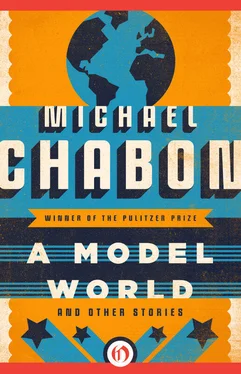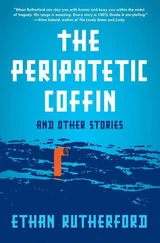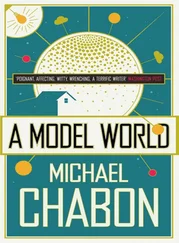Michael Chabon - A Model World And Other Stories
Здесь есть возможность читать онлайн «Michael Chabon - A Model World And Other Stories» — ознакомительный отрывок электронной книги совершенно бесплатно, а после прочтения отрывка купить полную версию. В некоторых случаях можно слушать аудио, скачать через торрент в формате fb2 и присутствует краткое содержание. Год выпуска: 2011, Издательство: Open Road Media, Жанр: Современная проза, на английском языке. Описание произведения, (предисловие) а так же отзывы посетителей доступны на портале библиотеки ЛибКат.
- Название:A Model World And Other Stories
- Автор:
- Издательство:Open Road Media
- Жанр:
- Год:2011
- ISBN:нет данных
- Рейтинг книги:5 / 5. Голосов: 1
-
Избранное:Добавить в избранное
- Отзывы:
-
Ваша оценка:
- 100
- 1
- 2
- 3
- 4
- 5
A Model World And Other Stories: краткое содержание, описание и аннотация
Предлагаем к чтению аннотацию, описание, краткое содержание или предисловие (зависит от того, что написал сам автор книги «A Model World And Other Stories»). Если вы не нашли необходимую информацию о книге — напишите в комментариях, мы постараемся отыскать её.
A Model World And Other Stories — читать онлайн ознакомительный отрывок
Ниже представлен текст книги, разбитый по страницам. Система сохранения места последней прочитанной страницы, позволяет с удобством читать онлайн бесплатно книгу «A Model World And Other Stories», без необходимости каждый раз заново искать на чём Вы остановились. Поставьте закладку, и сможете в любой момент перейти на страницу, на которой закончили чтение.
Интервал:
Закладка:
“Never again,” his mother said at last.
Dr. Shapiro let the shells fall. He rubbed his hands together and then stared at them as though waking from a dream in which he had been holding a fortune in gold Straightening up so quickly that his head spun, Nathan let out a cry and pointed down at the sand beneath their feet, among the scattered shells. “Look at those weird tracks!” he cried.
They all looked down.
Speculation on the nature of the beast that went toeless down the shore went on for several minutes, and although Nathan was delighted at first, he soon began to feel embarrassed and, obscurely, frightened by the ease with which he had deceived his parents. His treachery was almost exposed when Ricky, carrying a long stick and wearing a riot of Magic Marker tattoos on his face and all down his arms, ran over to find out what was happening. The little boy immediately tipped back onto his heels, and would have taken a few steps like that had Nathan not grabbed him by the elbow and dragged him aside.
“Why do you have a dog on your face?” said Nathan.
“It’s a jaguar,” said Ricky.
Nathan bent to whisper into his brother’s ear. “I’m tricking Mom and Dad,” he said.
“Good,” said Ricky.
“They think there’s some kind of weird creature on the beach.”
Ricky pushed Nathan away and then surveyed their mother and father, who were talking again, quietly, as though they were trying not to alarm their sons. “It can’t be real,” said Nathan’s father.
Ricky’s skin under the crude tattoos was tanned, his hair looked stiff and ragged from going unwashed and sea-tangled, and as he regarded their parents he held his skinny stick like a javelin at his side. “They’re dumb,” he said flatly.
Dr. Shapiro approached, stepping gingerly across the mysterious tracks, and then knelt beside his sons. His face was red, though not from the sun, and he seemed to have trouble looking directly at the boys. Nathan began to cry before his father even spoke.
“Boys,” he said. He looked away, then back, and bit his lip. “I’m afraid — I’m sorry. We’re going to go home. Your mom and I — don’t feel very well. We don’t seem to be well.”
“No! No! It was Nathan!” said Ricky, laying down his spear and throwing himself into his father’s arms. “It wasn’t me. Make him go home.”
Nathan, summoning up his courage, decided to admit that the curious trail of the crippled animal was his, and he said, “I’m responsible.”
“Oh, no!” cried both his parents together, startling him. His mother rushed over and fell to her knees, and they took Nathan into their arms and said that it was never, never him, and they ruffled his hair with their fingers, as though he had done something they could love him for.
After they came back from dinner, the Shapiros, save Nathan, went down to the sea for a final, sad promenade. At the restaurant, Ricky had pleaded with his parents to stay through the end of the week — they had not even been to see the monument at Kitty Hawk, the Birthplace of Aviation. For Ricky’s sake, Nathan had also tried to persuade them, but his heart wasn’t in it — he himself wanted so badly to go home — and the four of them had all ended up crying and chewing their food in the brass-and-rope dining room of the Port O’ Call; even Dr. Shapiro had shed a tear. They were going to leave that night. Nathan’s family now stood, in sweatshirts, by the sliding glass door, his parents straining to adopt hard and impatient looks, and Nathan saw that they felt guilty about leaving him behind in the cottage.
“I’ll pack my stuff,” he said. “Just go.” For a moment his stomach tightened with angry, secret glee as his mother and father, sighing, turned their backs on him and obeyed his small command. Then he was alone in the kitchen again, for the second time that day, and he wished that he had gone to look at the ocean, and he hated his parents, uncertainly, for leaving him behind. He got up and walked into the bedroom that he and Ricky had shared. There, in the twilight that fell in orange shafts through the open window, the tangle of their clothes and bedsheets, their scattered toys and books, the surfaces of the broken dresser and twin headboards seemed dusted with a film of radiant sand, as though the tide had washed across them and withdrawn, and the room was strewn with the seashells they had found. Nathan, after emptying his shoebox of baseball cards into his suitcase, went slowly around the room and harvested the shells with careful sweeps of his trembling hand. Bearing the shoebox back into the kitchen, he collected the few stray shards of salt-white and green beach glass that lay in a pile beside the electric can opener, and then added a hollow pink crab’s leg in whose claw Ricky had fixed a colored pencil. When Nathan saw the little knife in the drainboard by the sink, he hesitated only a moment before dropping it into the box, where it swam, frozen, like a model shark in a museum diorama of life beneath the sea. Nathan chuckled. As clearly as if he were remembering them, he foresaw his mother’s accusation, his father’s enraged denial, and with an unhappy chuckle he foresaw, recalled, and fondly began to preserve all the discord for which, in his wildly preserving imagination, he was and would always be responsible.
More Than Human
THROUGHOUT THE DISMAL, INADEQUATE spring that preceded his moving out of the house, Dr. Shapiro drew his sustenance and cheer from the evenings on which he and his son made library rounds. The Henrietta County Library System was wealthy and adventuring, and maintained well-provisioned outposts even at the farthest reaches of its empire, so that in only a few hours he and Nathan, like a bookish Mongol horde of two, could hit a dozen different libraries and return with a rich booty of fourteen-day New Arrivals and, for Nathan, books about baseball, mythology, and the exploits of civilized mice. Dr. Shapiro was trying to wean his son onto science fiction, according to the natural progression, as he had experienced it, from childhood to adolescence, and had been recommending the paranoid novels of his own youth— Slan and The Demolished Man and What Mad Universe —of which Nathan had preferred the first, whose youthful protagonist has two hearts.
There was avid competition for fourteen-day books in Henrietta County, which was the ostensible reason for these weekly raids and the explanation that Dr. Shapiro gave to his wife and even to Nathan. His true motive was his lifelong need of minor rituals, a need that had lately become almost compulsive as the extreme state of his marriage and the sadness of his new job — he was working at Sunny Valley Farms, a small private psychiatric clinic for children, where he was exposed to a great deal of various and fairly sinister childhood lunacy — had robbed his life of the quotidian and left him with all the surprising novelty of a nightmare. His pipe, his weekly move in his correspondence chess game, and his trips with Nathan across the backroads of Henrietta County were the only commonplace ceremonies he had.
On Thursday nights, when the libraries stayed open until nine, he would come home from work, shower, put on blue jeans and a clean shirt, and sit down to watch the last fifteen minutes of Lost in Space with Nathan. Dr. Shapiro, who at his son’s age had attempted, according to a recipe given by an article in Science Wonder Stories, to create life in a laundry pail, took a guilty interest in the show, and had seen every absurd episode at least once. After it was over, he and Nathan would leave Rose and Ricky to their dinner, step, still chuckling, into the drizzle and hydrangea, and drive off. As he guided the car onto the winding old tobacco road that led across townhouse parks and cornfields to the Gunpowder Creek Branch, the unremarkable Landscape and the quizzical conversation of his son would bore and relax him, and leave him feeling halfway blessed and less mindful of his grip on the wheel.
Читать дальшеИнтервал:
Закладка:
Похожие книги на «A Model World And Other Stories»
Представляем Вашему вниманию похожие книги на «A Model World And Other Stories» списком для выбора. Мы отобрали схожую по названию и смыслу литературу в надежде предоставить читателям больше вариантов отыскать новые, интересные, ещё непрочитанные произведения.
Обсуждение, отзывы о книге «A Model World And Other Stories» и просто собственные мнения читателей. Оставьте ваши комментарии, напишите, что Вы думаете о произведении, его смысле или главных героях. Укажите что конкретно понравилось, а что нет, и почему Вы так считаете.












